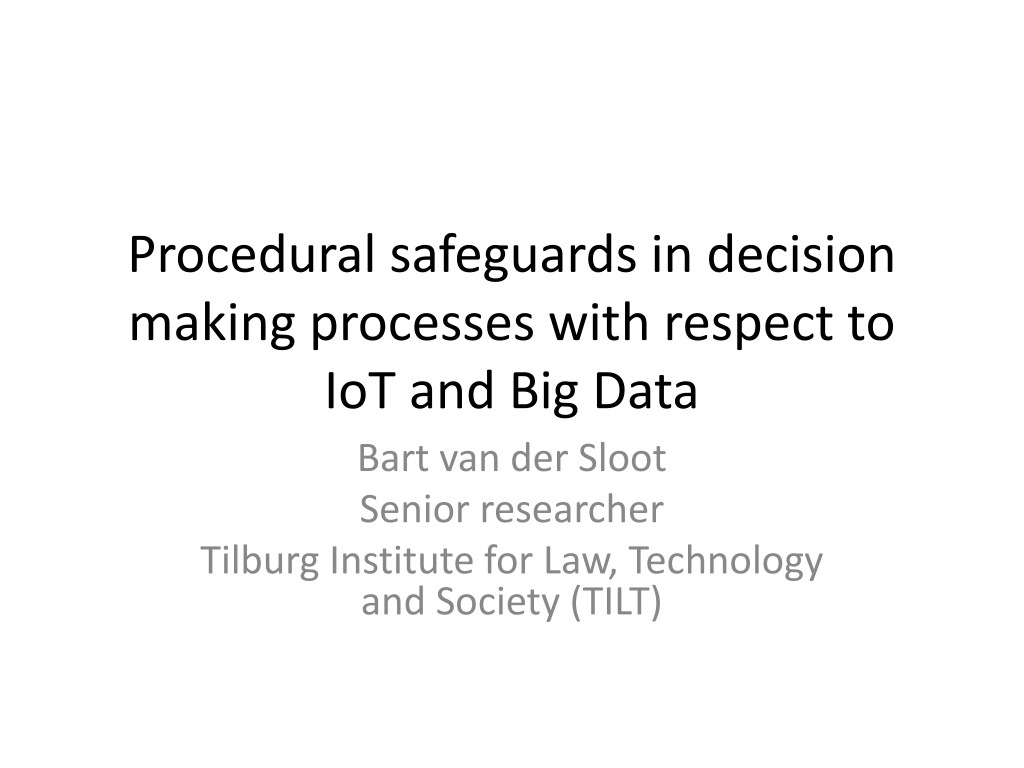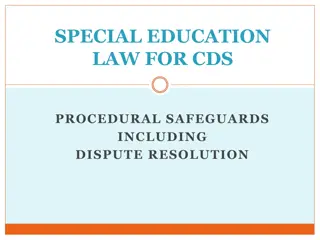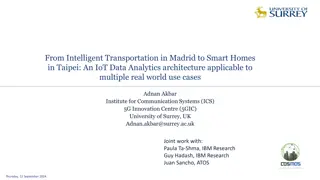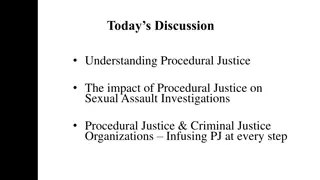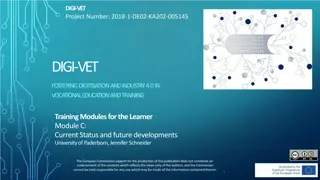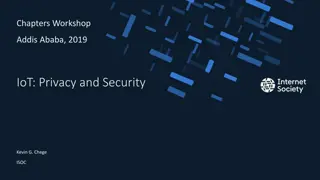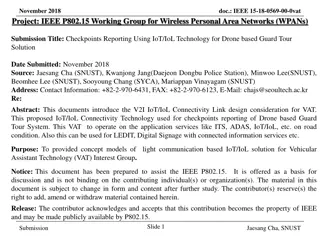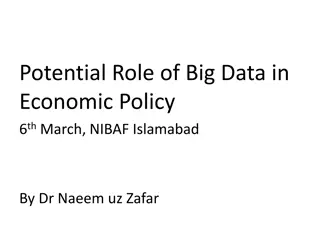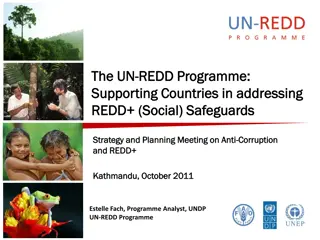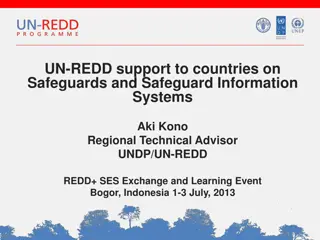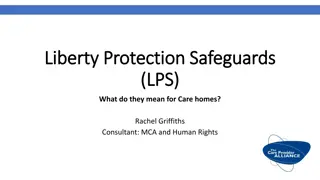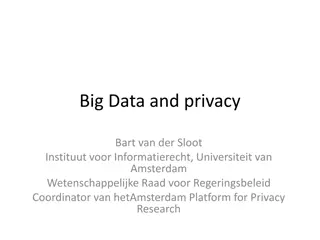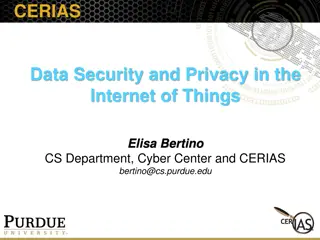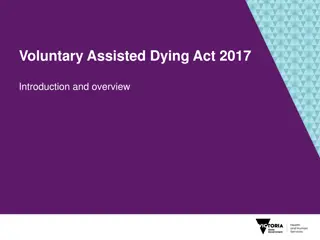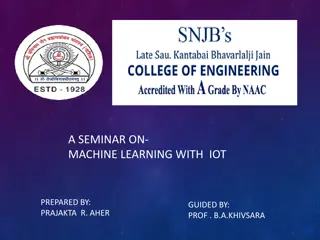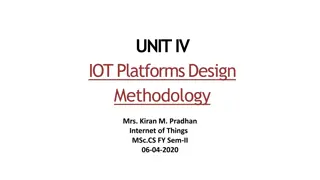Procedural Safeguards in Decision-Making Processes with Respect to IoT and Big Data
Bart van der Sloot, a Senior Researcher at Tilburg Institute for Law, Technology, and Society, discusses procedural safeguards in decision-making processes related to IoT and Big Data. The overview includes topics such as access and use paradigms, decision-making in GDPR and ECHR, and the importance of developing rules for the phase between data gathering and usage.
Uploaded on Sep 30, 2024 | 0 Views
Download Presentation

Please find below an Image/Link to download the presentation.
The content on the website is provided AS IS for your information and personal use only. It may not be sold, licensed, or shared on other websites without obtaining consent from the author. Download presentation by click this link. If you encounter any issues during the download, it is possible that the publisher has removed the file from their server.
E N D
Presentation Transcript
Procedural safeguards in decision making processes with respect to IoT and Big Data Bart van der Sloot Senior researcher Tilburg Institute for Law, Technology and Society (TILT)
Overview (1) Acces Use (2) Decision making in the GDPR (3) Decision making in the ECHR (4) Conclusion
(1) Acces Use Current paradigm focusses primarily on the gathering of personal data Proposals from the industry + American scholars to focus more/only on the use of personal data Recent proposal Homo Digitalis by Lokke Moerel en Corien Prins
(1) Acces Use WRR: Big Data in een vrije en veilige samenleving Keep rules on gathering data and strengthen them Develop additional rules for using the data But most importantly: develop rules for the phase in between the gathering and the use of data
(1) Acces Use Data should be correct Methodology for gathering data Methodology for combining datasets Which algortihms are used Meta data on the gathering, combining and anlyses of the data Transparancy in the black box Assessement of the profiles produced Assessement of the goals that are achieved
(2) Decision making in the GDPR Article 22 Automated individual decision-making, including profiling 1. The data subject shall have the right not to be subject to a decision based solely on automated processing, including profiling, which produces legal effects concerning him or her or similarly significantly affects him or her. 2. Paragraph 1 shall not apply if the decision: (a) is necessary for entering into, or performance of, a contract between the data subject and a data controller; (b) is authorised by Union or Member State law to which the controller is subject and which also lays down suitable measures to safeguard the data subject's rights and freedoms and legitimate interests; or (c) is based on the data subject's explicit consent. 3. In the cases referred to in points (a) and (c) of paragraph 2, the data controller shall implement suitable measures to safeguard the data subject's rights and freedoms and legitimate interests, at least the right to obtain human intervention on the part of the controller, to express his or her point of view and to contest the decision. 4. Decisions referred to in paragraph 2 shall not be based on special categories of personal data referred to in Article 9(1), unless point (a) or (g) of Article 9(2) applies and suitable measures to safeguard the data subject's rights and freedoms and legitimate interests are in place.
(2) Decision making in the GDPR Article 13 Information to be provided where personal data are collected from the data subject 2.In addition to the information referred to in paragraph 1, the controller shall, at the time when personal data are obtained, provide the data subject with the following further information necessary to ensure fair and transparent processing: (f) the existence of automated decision-making, including profiling, referred to in Article 22(1) and (4) and, at least in those cases, meaningful information about the logic involved, as well as the significance and the envisaged consequences of such processing for the data subject.
(2) Decision making in the GDPR Article 14 Information to be provided where personal data have not been obtained from the data subject 2.In addition to the information referred to in paragraph 1, the controller shall provide the data subject with the following information necessary to ensure fair and transparent processing in respect of the data subject: (g) the existence of automated decision-making, including profiling, referred to in Article 22(1) and (4) and, at least in those cases, meaningful information about the logic involved, as well as the significance and the envisaged consequences of such processing for the data subject.
(2) Decision making in the GDPR Article 15 Right of access by the data subject 1.The data subject shall have the right to obtain from the controller confirmation as to whether or not personal data concerning him or her are being processed, and, where that is the case, access to the personal data and the following information: (h) the existence of automated decision-making, including profiling, referred to in Article 22(1) and (4) and, at least in those cases, meaningful information about the logic involved, as well as the significance and the envisaged consequences of such processing for the data subject.
(2) Decision making in the GDPR Article 47 Binding corporate rules 2.The binding corporate rules referred to in paragraph 1 shall specify at least: (e) the rights of data subjects in regard to processing and the means to exercise those rights, including the right not to be subject to decisions based solely on automated processing, including profiling in accordance with Article 22, the right to lodge a complaint with the competent supervisory authority and before the competent courts of the Member States in accordance with Article 79, and to obtain redress and, where appropriate, compensation for a breach of the binding corporate rules;
(2) Decision making in the GDPR Article 70 Tasks of the Board 1.The Board shall ensure the consistent application of this Regulation. To that end, the Board shall, on its own initiative or, where relevant, at the request of the Commission, in particular: (f) issue guidelines, recommendations and best practices in accordance with point (e) of this paragraph for further specifying the criteria and conditions for decisions based on profiling pursuant to Article 22(2);
(3) Decision making in the ECHR ARTICLE 6 Right to a fair trial 1. In the determination of his civil rights and obligations or of any criminal charge against him, everyone is entitled to a fair and public hearing within a reasonable time by an independent and impartial tribunal established by law. Judgment shall be pronounced publicly but the press and public may be excluded from all or part of the trial in the interests of morals, public order or national security in a democratic society, where the interests of juveniles or the protection of the private life of the parties so require, or to the extent strictly necessary in the opinion of the court in special circumstances where publicity would prejudice the interests of justice. 2. Everyone charged with a criminal offence shall be presumed innocent until proved guilty according to law. 3. Everyone charged with a criminal offence has the following minimum rights: (a) to be informed promptly, in a language which he understands and in detail, of the nature and cause of the accusation against him; (b) to have adequate time and facilities for the preparation of his defence; (c) to defend himself in person or through legal assistance of his own choosing or, if he has not sufficient means to pay for legal assistance, to be given it free when the interests of justice so require; (d) to examine or have examined witnesses against him and to obtain the attendance and examination of witnesses on his behalf under the same conditions as witnesses against him; (e) to have the free assistance of an interpreter if he cannot understand or speak the language used in cour
(3) Decision making in the ECHR ARTICLE 5 Right to liberty and security 1. Everyone has the right to liberty and security of person. No one shall be deprived of his liberty save in the following cases and in accordance with a procedure prescribed by law: (a) the lawful detention of a person after conviction by a competent court; (b) the lawful arrest or detention of a person for noncompliance with the lawful order of a court or in order to secure the fulfilment of any obligation prescribed by law; (c) the lawful arrest or detention of a person effected for the purpose of bringing him before the competent legal authority on reasonable suspicion of having committed an offence or when it is reasonably considered necessary to prevent his committing an offence or fleeing after having done so; (d) the detention of a minor by lawful order for the purpose of educational supervision or his lawful detention for the purpose of bringing him before the competent legal authority; (e) the lawful detention of persons for the prevention of the spreading of infectious diseases, of persons of unsound mind, alcoholics or drug addicts or vagrants; (f) the lawful arrest or detention of a person to prevent his effecting an unauthorised entry into the country or of a person against whom action is being taken with a view to deportation or extradition. 2. Everyone who is arrested shall be informed promptly, in a language which he understands, of the reasons for his arrest and of any charge against him. 3. Everyone arrested or detained in accordance with the provisions of paragraph 1 (c) of this Article shall be brought promptly before a judge or other officer authorised by law to exercise judicial power and shall be entitled to trial within a reasonable time or to release pending trial. Release may be conditioned by guarantees to appear for trial. 4. Everyone who is deprived of his liberty by arrest or detention shall be entitled to take proceedings by which the lawfulness of his detention shall be decided speedily by a court and his release ordered if the detention is not lawful. 5. Everyone who has been the victim of arrest or detention in contravention of the provisions of this Article shall have an enforceable right to compensation.
(3) Decision making in the ECHR ARTICLE 7 No punishment without law 1. No one shall be held guilty of any criminal offence on account of any act or omission which did not constitute a criminal offence under national or international law at the time when it was committed. Nor shall a heavier penalty be imposed than the one that was applicable at the time the criminal offence was committed. 2. This Article shall not prejudice the trial and punishment of any person for any act or omission which, at the time when it was committed, was criminal according to the general principles of law recognised by civilised nations.
(3) Decision making in the ECHR ARTICLE 13 Right to an effective remedy Everyone whose rights and freedoms as set forth in this Convention are violated shall have an effective remedy before a national authority notwithstanding that the violation has been committed by persons acting in an official capacity.
(3) Decision making in the ECHR ARTICLE 14 Prohibition of discrimination The enjoyment of the rights and freedoms set forth in this Convention shall be secured without discrimination on any ground such as sex, race, colour, language, religion, political or other opinion, national or social origin, association with a national minority, property, birth or other status.
(3) Decision making in the ECHR ARTICLE 34 Individual applications The Court may receive applications from any person, nongovernmental organisation or group of individuals claiming to be the victim of a violation by one of the High Contracting Parties of the rights set forth in the Convention or the Protocols thereto. The High Contracting Parties undertake not to hinder in any way the effective exercise of this right.
(3) Decision making in the ECHR ECtHR, R. v. The United Kingdom, appl.no. 10496/83, 8 July 1987. ECtHR, W. v. The United Kingdom, appl.no. 9749/82, 8 July 1987. ECtHR, B. v. the United Kingdom, appl.no. 9840/82, 08 July 1987, 58. Even before assessing those cases in substance, the Court remarked regarding the scope of the issues before it that the background to the instant case is constituted by certain judicial or local authority decisions regarding the applicant s child S. The Court finds it important to emphasise at the outset that the present judgment is not concerned with the merits of those decisions; this issue was not raised by the applicant before the Commission and did not form part of the application which it declared admissible. Since the Commission s admissibility decision delimits the compass of the case brought before the Court, the latter is not in the circumstances competent to examine or comment on the justification for such matters as the taking into public care or the adoption of the child or the restriction or termination of the applicant s access to him.
(3) Decision making in the ECHR In its general principles, the Court referred to the fact that although the essential object of Article 8 is to protect the individual against arbitrary interference by the public authorities, there may in addition be positive obligations inherent in an effective respect for family life. The Court recognized that local authorities are faced with a task that is extremely difficult and it would only add to their problems to require them to follow on each occasion an inflexible procedure. Still, it emphasized that the decision in the type of cases before it may well prove to be irreversible as where a child has been taken away from his parents and placed with alternative caretakers, he may in the course of time establish with them new bonds which it might not be in his interests to break by reversing a previous decision to restrict or terminate parental access to him.
(3) Decision making in the ECHR The Court then turned to hold its principle consideration: It is true that Article 8 contains no explicit procedural requirements, but this is not conclusive of the matter. The local authority s decision-making process clearly cannot be devoid of influence on the substance of the decision, notably by ensuring that it is based on the relevant considerations and is not one-sided and, hence, neither is nor appears to be arbitrary. Accordingly, the Court is entitled to have regard to that process to determine whether it has been conducted in a manner that, in all the circumstances, is fair and affords due respect to the interests protected by Article 8. Moreover, the Court observes that the English courts can examine, on an application for judicial review of a decision of a local authority, the question whether it has acted fairly in the exercise of a legal power. The relevant considerations to be weighed by a local authority in reaching decisions on children in its care must perforce include the views and interests of the natural parents. The decision-making process must therefore, in the Court s view, be such as to secure that their views and interests are made known to and duly taken into account by the local authority and that they are able to exercise in due time any remedies available to them. ECtHR, B. v. The United Kingdom, application no. 9840/82, 8 July 1987, 63-64.
(3) Decision making in the ECHR This approach has grown since then: It finds that the absence of such a forum or mechanism in the present case discloses a fundamental shortcoming since the applicant as a result was not involved in the decision-making procedure to the degree sufficient to provide him with the requisite protection of his interest. Consequently, the interference complained of cannot be regarded as "necessary" within the meaning of Article 8 para. 2 of the Convention. ECmHR, Boyle v. the United Kingdom, appl.no. 16580/90, 09 June 1993.
(3) Decision making in the ECHR In McMichael v. the United Kingdom (1993), the Commission also found a violation of Article 8 ECHR as the applicants had no sight of reports and documents which were relevant to the proceedings regarding the taking into care of their child and which contained matters at least indirectly relating to the welfare of their child and their own capacities in that respect. Thus the Commission found that the procedure whereby the confidential reports and other documents, which were before the Children' Hearings when they took decisions relating to A. [the child] and the applicants' relationship with him, were not disclosed to the applicants, failed to afford them the requisite protection of their interests. Consequently, there has in that regard been a failure to respect the applicants' family life. Even having regard to the State's margin of appreciation, the fair balance which has to be struck between the interests of the applicants and other legitimate interests has not been attained. ECmHR, McMichael v. the United Kingdom, appl.no. 16424/90, 31 August 1993.
(3) Decision making in the ECHR The Court (1995) confirmed this view and also responded to the Government s suggestion that in so far as the nondisclosure to the second applicant of documents before the children s hearing was held to have rendered the procedure unfair and infringed her rights under Article 6 para. 1, it was unnecessary to examine the same complaint under Article 8 as no separate issue arose. The Court however pointed to the difference in the nature of the interests protected by Articles 6 para. 1 and 8. Thus, Article 6 para. 1 affords a procedural safeguard, namely the "right to a court" in the determination of one s "civil rights and obligations"; whereas not only does the procedural requirement inherent in Article 8 cover administrative procedures as well as judicial proceedings, but it is ancillary to the wider purpose of ensuring proper respect for, inter alia, family life. The difference between the purpose pursued by the respective safeguards afforded by Articles 6 para. 1 and 8 may, in the light of the particular circumstances, justify the examination of the same set of facts under both Articles. ECtHR, McMichael v. the United Kingdom, appl.no. 16424/90, 24 June 1995, 91. See further: K. Reid, Child care cases and the European Convention on Human Rights , Child and Family Law Quartely, Vol 5, No 2, 1993.
(3) Decision making in the ECHR In TP and KM v. the United Kingdom (1998), the Commission continued to build on this practice with regard to parents faced with serious allegations relating to abuse or other ill-treatment of the children. It emphasized the importance of full information as to the factual basis of these allegations and it focussed again on the essential element of time in these cases. The Commission stressed that it is not the parents responsibility to investigate the reliability of purported evidence relied on by local authorities or litigate to obtain such information but considered that the authorities should, from an early stage and as soon as practically possible, provide for the material to be viewed and it emphasized that in particular, where the material concerned is used to justify an emergency measure of removal, a delay of more than a year in such material being made available is unjustifiable. ECmHR, T.P. and K.M. v. the United Kingdom, appl.no. 28945/95, 26 May 1998. See further: ECtHR, T.P. and K.M. v. the United Kingdom, appl.no. 28945/95, 10 May 2001.
(3) Decision making in the ECHR It goes too far to discuss every case in which the procedural requirements were invoked, but especially after 2000 the Court has increasingly relied on these principles. In the following cases which will be discussed below, the Court found a violation of Article 8 ECHR in relation to, among others, disrespect for the procedural requirements implicit in Article 8 ECHR. In Elsholz v. Germany (2000), the Court referred to the combination of the refusal to order an independent psychological report and the absence of a hearing before the regional court. In Buchberger v. Austria (2001), the Court found a failure of the regional court to inform the applicant of the additional evidence obtained during the appeal proceedings which deprived her of the possibility to react thereto. In P., C. and S. v. the United Kingdom (2002), the Court referred to the lack of legal representation of the applicants during the care proceedings and during the freeing for adoption proceedings, together with the lack of any real lapse of time between the two procedures. In Venema v. the Netherlands (2002), the Court found an unjustified failure to allow the applicants to participate in the decision- making process leading to the making of the provisional order to separate the child from her parents. In Kosmopoulu v. Greece (2004), the Court noted that a psychological report was released only after four years to the applicant and also found that none of the three psychologists who drafted a medical report examined the applicant in order to reach their conclusions. In Haase v. Germany (2004), the national court had failed to allow the applicants to participate in the decision- making process. In C. v. Finland (2006), a national court had awarded custody without holding an oral hearing in which the parties were invited to address the matter. In Moser v. Austria (2006), the Court also established a violation of Article 8 because there was insufficient involvement in the decision making process. ECtHR, Ignaccolo-Zenide v. Romania, appl.no. 31679/96, 25 January 2000. ECtHR, Elsholz v. Germany, appl.no. 25735/94, 13 July 2000. ECtHR, Buchberger v. Austria, appl.no. 32899/96, 20 December 2001. ECtHR, P., C. and S. v. the United Kingdom, appl.no. 56547/00, 16 July 2002. ECtHR, Venema v. the Netherlands, appl.no. 35731/97, 17 December 2002. ECtHR, Kosmopoulou v. Greece, appl.no. 60457/00, 05 February 2004. ECtHR, Haase v. Germany, appl.no. 11057/02, 08 April 2004 ECtHR, C. v. Finland, appl.no. 18249/02, 09 May 2006. ECtHR, Moser v. Austria, appl.no. 12643/02, 21 September 2006.
(3) Decision making in the ECHR In Kaplan v. Austria (2007), the domestic courts did not comply with their duty to deal diligently with the applicant s request to grant her custody of her son. In X. v. Croatia (2008), the applicant was excluded from the proceedings leading to the adoption of her daughter. In Jucius and Juciuvien v. Lithuania (2008), the national courts had not adhered to a right to a speedy trial. In Saviny v. Ukraine (2008), at no stage of the proceedings were the children heard by the judges. In A.D. and O.D. v. the United Kingdom (2010), the Court found a violation because a child had not been returned to the parents care immediately after a final assessment of their situation, which should have led them to, but only after one and a half month. In Mustafa and Akin v. Turkey (2010), the court of cassation did not address the two detailed submissions made by the applicants, but merely held that the lower Court had adequately examined the evidence available to it and that its conclusion had been in accordance with the applicable legislation. In Kurochkin v. Urkaine (2010), the domestic authorities did not carry out a careful assessment of the impact which the annulment of the adoption might have had on the future well-being of the orphan child or explore any other less far-reaching alternatives. In Anayo v. Germany (2010), the court of appeal failed to give any consideration to the question whether contact between the twins and the applicant would be in the children s best interest. ECtHR, Kaplan v. Austria, appl.no. 45983/99, 18 January 2007. ECtHR, X. v. Croatia, appl.no. 11223/04, 17 July 2008. ECtHR, Jucius and Juciuviene v. Lithania, appl.no. 14414/03, 25 November 2008. ECtHR, Saviny v. Ukraine, appl.no. 39948/06, 18 December 2008. ECtHR, A.D. and O.D. v. the United Kingdom, appl.no. 28680/06, 16 March 2010. ECtHR, Mustafa and Akin v. Turkey, appl.no. 4694/03, 06 April 2010. ECtHR, Kurochkin v. Ukraine, appl.no. 42276/08, 20 May 2010. ECtHR, Anayo v. Germany, appl.no. 20578/07, 21 December 2010.
(3) Decision making in the ECHR In Schneider v. Germany (2011), the domestic courts had failed to give any consideration to the question whether contact between child and the applicant would be in child s best interest and furthermore, they did not allow the applicant s request to be given at least information about the child s personal development. In Kopf and Liberda v. Austria (2012), the domestic courts did not comply with their duty under Article 8 to deal diligently with the applicants request for visiting rights of their former foster child. In Karrer v. Romania (2012), no in-depth analysis was conducted with a view to assessing the child s best interests and the applicant was not given the opportunity to present his case in an expeditious manner. In Str mblad v. Sweden (2012), the Court could not find that the domestic courts dealt diligently with the applicant s request to grant him custody of his daughter. In M.D. and others v. Malta (2012), the paternity rights had been permanently forfeited and there was a lack of access to a court to challenge the deprivation of parental rights at a future date. In A.K. and L. v. Croatia (2013), the Court held that by not informing the first applicant about the adoption proceedings of her child, the national authorities deprived her of the opportunity to seek restoration of her parental rights before the ties between the biological parent and child were finally severed by the child s adoption. Finally, in B.B. and F.B. v. Germany (2013), the Court considered that the domestic courts, in the main proceedings, did not provide sufficient reasons for withdrawing the applicant s parental rights. ECtHR, Schneider v. Germany, appl.no. 17080/07, 15 September 2011. ECtHR, Kopf and Liberda v. Austria, appl.no. 1598/06, 17 January 2012. ECtHR, Karrer v. Romania, appl.no. 16965/10, 21 February 2012. ECtHR, Stromblad v. Sweden, appl.no. 3684/07, 05 April 2012. ECtHR, M.D. and others v. Malta, appl.no. 64791/10, 17 July 2012. ECtHR, A.K. and L. v. Croatia, appl.no. 37956/11, 08 January 2013. ECtHR, B.B. and F.B. v. Germany, appl.nos. 18734/09 and 9424/11, 14 March 2013.
(3) Decision making in the ECHR In conclusion, in cases regarding the upbringing of children, whether they regard custody disputes between parents, the placing out of home of children or signing them up for adoption, the Court relies principally and increasingly on the procedural elements of the matters, such as: the right to be informed, the right to access to a court, the right to a speedy trial, the right to a hearing, the right to independent and balanced expert opinions, the right to take part in the decision making process and the right to a full and comprehensible explanation by the courts and national authorities regarding their decisions.
(3) Decision making in the ECHR The acceptance of procedural safeguards has also had an important effect on other aspects of article 8 ECHR, such as Immigrants, who claim that their expulsion, the denial to enter national territory or the refusal to grant them a residence permit has grave impact on their family life. Again, the Court is hesitant to allow applicants substantive rights and freedoms and does not grant complainants a right to a residence permit or a legalized stay in a certain country. However, it is willing to accept that the procedural requirements implicit in Article 8 ECHR and the right to a fair decision-making process also apply to the claims of immigrants.
(3) Decision making in the ECHR Health and medicine issues Mentally ill subjected to tests or containment measures Legal capacity Administration of diamorphine Obtain a diagnosis of the foetus condition Tests within the time-limit for abortion
(3) Decision making in the ECHR The Court has transposed these notions to more general environmental cases and the right to live in a clean and healthy living environment. Guerra and others v. Italy (1998), the Court held that the applicant must be involved in the decision-making processes, that he must have access to full and comprehensive information and that the government should actively inform citizens of existing environmental threats. In Hatton and others v. the United Kingdom (2003), regarding noise pollution caused by an airport, the Court noted that the governmental decision-making process concerning complex issues of environmental and economic policy must necessarily involve appropriate investigations and studies in order to allow them to strike a fair balance between the various conflicting interests at stake. In Taskin and others v. Turkey (2004), the Court again primarily focussed on the procedural aspects of the case and found that the national court s judgment to close the operation of a gold mine was not effectuated within reasonable time and the Court emphasized that where administrative authorities refuse or fail to comply, or even delay doing so, the guarantees enjoyed by a litigant during the judicial phase of the proceedings are rendered devoid of purpose. In Giacomelli v. Italy (2006), In Grimkovskaya v. Ukraine (2011), In Vilnes and others v. Norway (2013), etc. etc.
(4) Conclusion Questions: (1) Is focussing on the analysis of data a good alternative to the acces-use debate? (2) Do the principles in the GDPR on this point suffice? (3) What is the added value of the ECtHR jurisprudence? (4) Is the focus on the decicion-making proces a way for the ECtHR to extend the scope of the right to privacy even further?
